Future of Canada Project announces seven Future Fellowship recipients
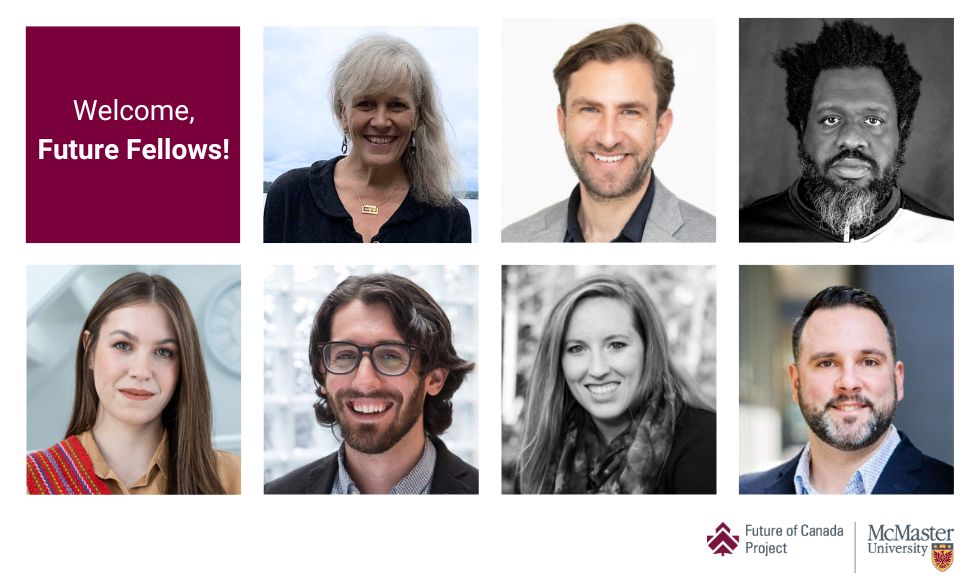
The Future of Canada Project has selected seven future-thinkers to participate in its Future Fellowship Program. Top row from left to right: Jayne Engle, Thomas Granofsky, Julius Lindsay. Bottom row from left to right: Samantha Matters, Michael Morden, Madeleine Orr and Nick Vlahos.
For the past three years, the Future of Canada Project has funded interdisciplinary research at McMaster with the goal of building a better future for Canada — one that is more equitable, resilient and prosperous for all.
To diversify the impact of the Project on Canada’s future, a new initiative was introduced this year that is engaging future-thinkers from across a variety of sectors and areas of interest — the Future Fellows Program.
“We were thrilled with the enthusiastic response to this innovative new program,” says Ann Elisabeth Samson, Strategic Advisor for the Future of Canada Project. “We received a huge number of applications from across the country and across disciplines, looking at a wide variety of important issues.”
After carefully considering each application, the Future of Canada Project is excited to announce the seven innovative leaders from across the country who have been selected as the 2023 Future Fellows: Jayne Engle, Thomas Granofsky, Julius Lindsay, Samantha Matters, Michael Morden, Madeleine Orr and Nick Vlahos.
This cohort of Future Fellows will carry out individual projects that will analyze, imagine and explore where Canada is headed, rather than where it is today.
While all the fellows’ projects are connected by the intention to make a positive impact on Canada’s future, they are distinct in how they plan to do so. The projects range from a foresight game that centres Indigenous and Black perspectives to engage people in climate action planning, to a multimedia project that will engage youth to develop hopeful narratives about Canada’s future.
“We wanted to create an opportunity for like-minded leaders from across the country to have the dedicated time and space to apply their creativity and use strategic foresight as a tool to explore Canada’s future,” says Pamela Swett, Future of Canada Project Academic Lead and Dean of the Faculty of Humanities.
“Being based at McMaster, the fellows will have the opportunity to collaborate with one another as well as develop those interdisciplinary connections that are so vital when it comes to future-focused work,” she says.
Each project addresses one or more themes outlined by the Future of Canada Project Council: climate change, rapid technological advancement, pandemic, challenge of reconciliation, and erosion of truth and trust while also considering the four key elements of our collective future as expressed by the Council: power, well-being, hope and community.
Dr. Samantha Nutt, Chair of the Future of Canada Project Council, looks forward to seeing how the Future Fellows’ work will help achieve the overall vision of the Project.
“The seven Future Fellows that have been selected are such a diverse and impressive group,” says Nutt.
“At the heart of the Future of Canada Project, and this fellowship program, is the idea that we can build a better Canada if we are willing to work together and think creatively. This group exemplifies this in both the challenges they are addressing and the innovative ways they are addressing them.”
The Future Fellows will share elements of their work at Imagining 2080: A Forum on Canada’s Futures taking place in Hamilton this November. The Forum is bringing together 150 future-minded leaders to collectively explore potential futures for Canada in what will be a highly participatory and collaborative experience.
For Swett, the Forum will be a highlight of the Future Fellowship.
“Sharing their work and collaborating with others at the Imagining 2080 Forum will be a valuable opportunity for each Future Fellow,” says Swett. “With many other future-thinkers in the same room, there will be enormous potential to push their work forward, make connections and create impact.”
Meet the 2023 Future Fellows:
Jayne Engle
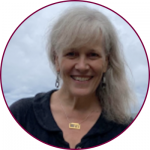 7GenCities: imagining and building communities for the future that embed Truth & Reconciliation
7GenCities: imagining and building communities for the future that embed Truth & Reconciliation
7GenCities will bring people together to engage in transformative thinking and action towards future city and community building, as well as Earth stewardship.
Thomas Granofsky
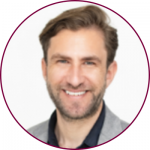 The future of Canada’s social safety net
The future of Canada’s social safety net
This project will examine the current state of Canada’s social safety net, its connection to our sense of who we are as Canadians, and its role in facing the emerging challenges of the 21st Century.
Julius Lindsay
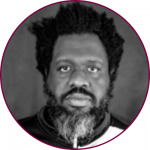 Prismatic project
Prismatic project
The Prismatic Project seeks to centre Indigenous and Black perspectives through the lens of Indigenous futurist and Afrofuturist art, community engagement and futures games to shift the conversation about and composition of climate action in Canada.
Samantha Matters
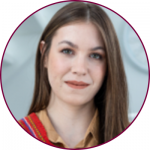 Indigenous Futures
Indigenous Futures
This project aims to address the gap between non-Indigenous Canadians’ understanding of reconciliation and the worldbuilding work being led by Indigenous communities today. It will do this by developing an online course that draws on the concept of ancestral accountability to support foresight practitioners in creating space to imagine brighter, equitable and distinctly Indigenous futures across what is currently known as Canada.
Michael Morden
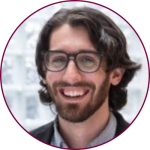 Democratic leadership that builds trust
Democratic leadership that builds trust
This project will gather evidence on how leaders can be supported in fostering social and political trust, as well as feature discussion on enduring, emerging and foreseeable threats to political trust in the future.
Madeleine Orr
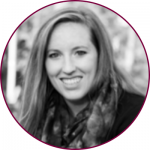 Happily ever after: a hopeful view of Canada’s future from Gen Z and Gen Alpha
Happily ever after: a hopeful view of Canada’s future from Gen Z and Gen Alpha
Happily Ever After intends to produce a counter-narrative to the dominant negative stories we’re told about the future. Through a nation-wide public scholarship project, which will visit all ten provinces and the Yukon, the project will ask young people what their future lives would look like if the current challenges we are facing were to improve.
Nick Vlahos
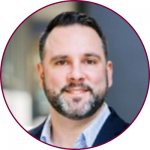 The potential of hyperlocal online spaces to rebuild trust, establish truth, and weather crisis through collective problem solving
The potential of hyperlocal online spaces to rebuild trust, establish truth, and weather crisis through collective problem solving
Hyperlocal online communities are growing. This project explores how to build capacity for individuals and organizations to use hyperlocal online spaces more inclusively and to find ways to ensure that they are used to weave communities together and positively impact the future of civic life in Canada at a local level.
Stay tuned to Future of Canada Project channels to learn more about the Future Fellows’ work as it progresses.


